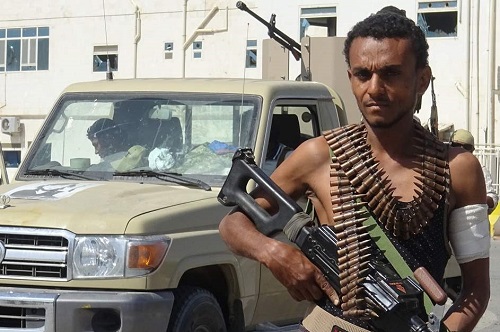AFP photo
By
Amnesty International
A new open-source investigation published by human rights NGO Amnesty International has highlighted how the United Arab Emirates is arming out-of-control militias operating in Yemen with a range of advanced weaponry – much of it sourced from Western countries, including the UK.
The investigation – “When arms go astray: Yemen’s deadly new threat of arms diversion to militias” – shows how the UAE has become a major conduit for armoured vehicles, mortar systems, rifles, pistols, and machine guns – which are being diverted to unaccountable militias accused of war crimes and other serious violations.
After analysing open-source evidence around the battle for the Yemeni port city of Hodeidah, Amnesty found that military vehicles and weapons supplied to the UAE are now widely in use by militias on the ground (see details of weapons and militias below).
According to publicly-available data, since the outbreak of the Yemeni conflict in 2015, Western countries have supplied the UAE with at least US$3.5billion worth of arms. These include heavy conventional weapons – including aircraft and ships – small arms, light weapons, and associated parts and ammunition. Despite the serious violations attributed to the UAE and militias it supports, the following countries, among others, have recently supplied the Emiratis with arms: Australia, Belgium, Brazil, Bulgaria, Czech Republic, France, Germany, South Africa, South Korea, Turkey, the UK and the USA. Meanwhile, Denmark, Finland, Norway and the Netherlands have announced suspensions in arms transfers to the UAE.
Amnesty is calling on all countries to halt arms transfers to all parties to the Yemen conflict while there is a substantial risk they would be used to commit or facilitate serious violations of international humanitarian and human rights law.
Patrick Wilcken, Amnesty International’s Arms Control and Human Rights Researcher, said:
“Emirati forces receive billions of dollars’ worth of arms from Western states and others, only to siphon them off to militias in Yemen that answer to no-one and are known to be committing war crimes.
“The proliferation of these fighting forces is a recipe for disaster for Yemeni civilians who have already been killed in their thousands, while millions more are on the brink of famine as a direct result of the war.
“Yemen is quickly becoming a safe haven for UAE-backed militias that are largely unaccountable.”
Details of weapons
A variety of US-supplied armoured vehicles equipped with heavy machine guns – including M-ATV, Caiman and MaxxPro models – have been documented as being in the hands of UAE-backed militias, including “Security Belt”, “Shabwani Elite” forces and “The Giants Brigades”. These are all trained and funded by the UAE, but are not accountable to any government. Some of them stand accused of war crimes, including during the recent Hodeidah offensive and in the UAE-backed network of secret prisons in southern Yemen.
Other weapons used by UAE-allied militias in Hodeidah include Serbian-made Zastava MO2 Coyote machine guns and the Agrab armoured-truck-mounted Singaporean 120mm mortar system – the UAE is the only country known to purchase this combined weapon system. Belgian Minimi light machine guns, also likely sold to the UAE, are meanwhile being deployed by “The Giants Brigades”.
UK role
Since the start of the Yemen conflict, the UK has licensed nearly £600 million worth of arms to the United Arab Emirates – including military vehicles and their parts and components worth £150 million, small arms and light weapons valued at £25 million, and £243million of military aircraft and their parts and components.
Oliver Sprague, Amnesty International UK’s Arms Expert, said:
“It’s extremely alarming that arms of the type licensed for export to the UAE by the UK are being diverted by the Emiratis to out-of-control militias operating in southern Yemen.
“According to its own arms export rules, the UK should long ago have halted the sale of all weapons to all parties to the conflict in Yemen because of the clear risk they would fuel further human rights abuse.”
Network of secret prisons
Elsewhere in Yemen, the UAE has directly trained and funded militias – including the including “Security Belt” and “Shabwani Elite” forces – operating a shadowy network of secret prisons. The militias running these sites wield Bulgarian rifles and drive US armoured vehicles. Amnesty and others have documented these forces’ role in disappearances and a range of human rights violations at these facilities – including detention at gunpoint, torture with electric shocks, waterboarding, hanging from the ceiling, sexual humiliation, prolonged solitary confinement, squalid conditions and inadequate food and water.
Amnesty International is a non-governmental organisation focused on human rights with over 7 million members and supporters around the world. The stated objective of the organisation is “to conduct research and generate action to prevent and end grave abuses of human rights, and to demand justice for those whose rights have been violated.”



No Comments Yet!
You can be first to comment this post!